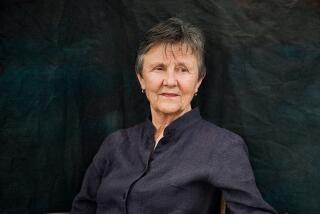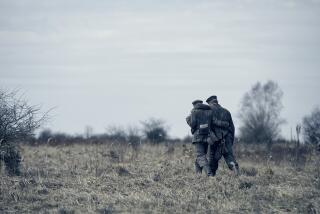Gunter Grass dies at 87; Nobel-winning German novelist
Günter Grass, a Nobel Prize-winning novelist who was an eloquent voice of moral outrage in postwar Germany but who stunned the nation with his 2006 admission that he had been a member of Hitler’s Waffen SS, died Monday. He was 87.
His death at a hospital in Lubeck, Germany, was announced by Steidl, his publisher. No cause was disclosed.
Grass, a pipe-smoking man with a walrus mustache, was known as a literary innovator who salted war-torn landscapes with sometimes surreal characters. In “The Tin Drum,” Grass’ first novel and one of his best known, his main character was Oskar Matzerath, a monstrous dwarf who, having willed himself to stay 3 years old forever, uses his toy drum to overpower those around him as he roams through Europe, has multiple affairs, performs miracles and commits atrocious crimes.
Oskar’s voice could shatter glass — a reference to Kristallnacht and the shattering of Jewish storefronts, critics have pointed out — and his constant drumming and unbearable egotism were meant to evoke Hitler himself.
Grass’ “frolicsome black fables portray the forgotten face of history,” the Nobel committee said when announcing Grass’ award in 1999.
Although Grass was cited for a lifetime of work that included more than 30 books, the 1959 publication of “The Tin Drum” marked “a new beginning (for German literature) after decades of linguistic and moral destruction,” Nobel organizers said. “Here, Grass comes to grips with the enormous task of reviewing contemporary history by recalling the disavowed and the forgotten: the victims, losers and lies that people wanted to forget because they had once believed in them.”
In a statement Monday, Germany’s culture minister, Monika Gruetters, said Grass would be remembered for centuries. “His literary legacy will stand next to that of Goethe,” she said.
But Grass is also remembered for half a century of silence on his involvement in the Waffen SS during the fading months of World War II. Like millions of other Germans, Grass was in the Nazi military — a fact he never hid. But until he did a newspaper interview in advance of his 2006 autobiography “Peeling the Onion,” he had not revealed that at age 17 he was in a tank unit of the Waffen SS — the combat arm of the elite organization that orchestrated the Holocaust.
In 1985, he did not bring it up when he denounced Chancellor Helmut Kohl and President Reagan for visiting a war cemetery in Bitburg that held the graves of 24 Waffen SS soldiers.
Years earlier, a man at a Grass book reading in Stuttgart popped lethal cyanide pills into his mouth, announcing: “And now, I’d like to salute my comrades from the SS.” Grass did not use the horrifying 1969 suicide as a platform to reveal his own fleeting SS association.
When he finally did so, his most virulent critics said he should be stripped of his Nobel prize. Cynics called it a publicity stunt.
Grass said he knew nothing of the Holocaust until, as an Allied POW, he was forced to tour Dachau. He said he had never asked for assignment to the SS.
“What I had accepted with the foolish pride of my youth was the very same thing I wanted to conceal from myself with a delayed sense of shame after the war,” he wrote. “But the burden remained and no one could make it lighter....”
Grass’ defenders said literature was richer for all the years he kept his secret.
“If Grass had not been living with this wretched little skeleton in his closet, he might never have written a word,” journalist Nathan Thornburgh wrote in Time magazine in 2006. “Instead, a haunted Grass cranked out a series of brutal novels about the war [that] helped his entire country stave off collective amnesia for decades.”
Grass was born in Danzig — now Gdansk, Poland — on Oct. 16, 1927, the son of a grocer who also was a minor government official. As a boy, Grass was in Nazi youth groups. He said he volunteered for the military at 15 to escape the tedium of life at home.
After the war, in which he was wounded, he was jobless and embittered. For a time, the artistically gifted Grass engraved tombstones for a cemetery in Dusseldorf. He also took art classes and played washboard in a jazz band.
In 1954, he married Anna Schwarz, a ballet student who entered his poems in a contest in a local radio station’s competition. When Grass took third place, he fell in with a group of experimental writers called Gruppe 47.
With their encouragement, he moved to Paris and worked on what became “The Tin Drum.” When it was released, it was hailed as liberating and denounced as blasphemous. He followed it up with “Cat and Mouse” and “Dog Years,” the remaining novels in his Danzig trilogy.
Many of his other novels, plays and essays deal with Germany coming to terms with its past. In accepting the Nobel, he spoke of “mountains of rubble and cadavers, fruit of the womb of German history. The more I shoveled, the more it grew. It simply could not be ignored.”
In 1987, he wrote comically but despairingly of the future. In “The Rat,” Grass gets his Christmas wish: a pet rat. But this particular rodent is also a prophet and spins a tale about humanity blowing itself up in a nuclear holocaust, leaving only rats to take its place.
A socialist, Grass was active in German politics but angered many Germans by opposing the nation’s reunification in 1990.
He also was sharply criticized for a 2012 poem, “What Must Be Said,” in which he describes Israel as a greater menace to world peace than Iran. In the poem, he said he had long kept his silence on the issue of Israeli nuclear weapons for fear of being branded as anti-Semite.
Grass’ survivors include four children from his marriage to Anna Schwarz, two stepchildren from a second marriage to Ute Grunert, and two children born to other partners.
Twitter: @schawkins
More to Read
Start your day right
Sign up for Essential California for the L.A. Times biggest news, features and recommendations in your inbox six days a week.
You may occasionally receive promotional content from the Los Angeles Times.







